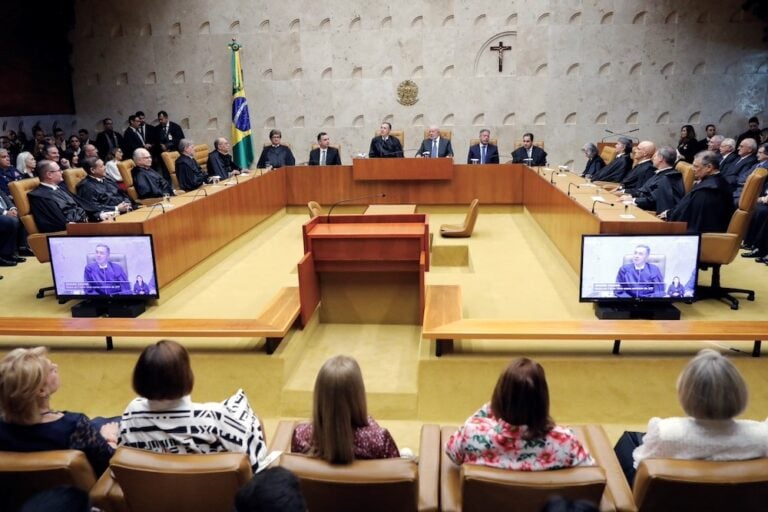(AMARC/IFEX) – On 27 January 1998, the Education Commission of the Brazilian Senate approved, without ammendments, the bill which will regulate community radio stations. The text was approved in the same form it arrived from the House of Congress. If it is maintained without any modifications in the plenary, it will be sent rapidly for […]
(AMARC/IFEX) – On 27 January 1998, the Education Commission of the Brazilian
Senate approved, without ammendments, the bill which will regulate community
radio stations. The text was approved in the same form it arrived from the
House of Congress. If it is maintained without any modifications in the
plenary, it will be sent rapidly for presidential approval. According to the
bill, all community radio stations will have a capacity of 25 watts
modulated frequecy. Licences will only be given to foundations or non-profit
associations.=20
** Complete Portuguese text of AMARC-Brazil press release is appended.
Version completa del boletin de prensa de AMARC-Brasil a continuacion.
Versao completa do boletim de prensa da AMARC/Brasil a continuacao**
The Union of Broadcasting Networks for Democracy, UNIRR/AMARC-Brazil, has
been denouncing the proposed legislation for over a year, arguing that it
creates serious restrictions on the activities of community radio stations
including:
cultural support
of
the concept of a “region”
the transmitter is located
All indications are that there will be no attempts to alter the text of the
law in the plenary and that it will receive the approval of President
Fernando Cardoso in the next few weeks.
AMARC-Brazil points out that several serious questions arise out of this new
situation. One is the question of the status of the stations that received
favorable legal decisions in the past from judges who, in the majority of
cases, ruled that the exercise of community broadcasting is a legal right –
one that was, until now, unregulated. AMARC-Brazil is concerned about what
guarantees there are that these stations will receive the new licences? It
is also concerned about what will happen in the cases where there are
several community stations in the same place, if only one frequency is
permitted per region.
COMUNICADO DE PRENSA – BRASIL
RADIOS COMUNITARIAS SAO APROVADAS NO BRASIL
COM PROJETO RESTRITIVO
A comissao de Educacao do Senando brasileiro, aprovou hoje, sem=20
emendas, o projeto que regulamenta as radios comunitarias. O texto
foi aprovado da forma como veio da Camara, e se for mantido sem
modificacoes no plenario sera enviado rapidamente a sancao=20
presidencial. Pelo projeto, cada emissora de radio tera a potencia
maxima de 25 Watts em frequencia modulada. A concessao sera dada
apenas a fundacoes ou associacoes sem fins lucrativos. Como a UNIRR/
AMARC-Brasil ja vem denunciando a mais de um ano, o projeto cria
graves restricoes a atividade dos radiodifusores comunitarios:=20
1. proibe a veiculacao de publicidade (fala apenas em patrocinio na forma
de apoio cultural);
2. estabelece uma frequencia para cada regiao (sem deixar claro o conceito
de regiao);
3. limita a potencia dos transmissores a 25 w;
4. proibe, sob qualquer circunstancia, a formacao de redes e
5. obriga os dirigentes da emissora a serem moradores na comunidade
aonde esta localizado o transmissor.
Ao que tudo indica, nao havera nenhuma tentativa de alteracao do
texto no plen=E1rio e o projeto devera receber a assinatura do Presidente
da Republica, Fernando Henrique Cardosos, nas proximas semanas.
Um outro desafio que surge a partir deste momento para as Radios=20
comunitarias brasileiras e o seguinte: como ficam as situacoes das
emissoras comunitarias que conseguiram medidas judiciais favoraveis se os
juizes deferiram em favor das nossas radios, na maioria dos casos, por
considerarem o exec=EDcio da radiodifusao comunitaria um direito legitimo,=
=20
porem ate entao nao regulamentado? Quem pode garantir que essas=20
emissoras serao recebedoras das novas autorgas? E como ficam as=20
situacoes de emissoras diferentes, com propostas comunitarias, de um
mesmo lugar, se o projeto preve apenas uma frequencia por regiao?
Sao bons temas para refletir e agir.
Sempre querendo e lutando por uma boa sintonia,
Marcus Aur=E9lio de Carvalho
Val=E9ria Mendon=E7a
Pela Coordena=E7ao UNIRR/AMRC-Brasil


